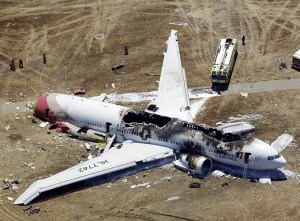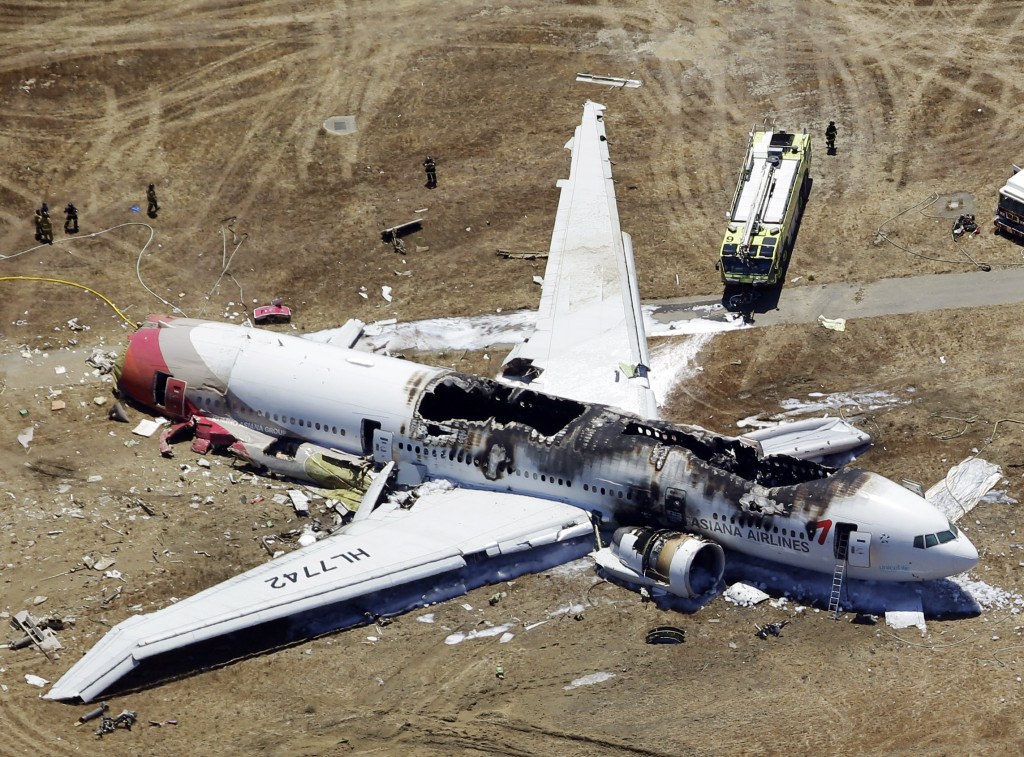Asiana Airlines Inc., the South Korean carrier that suffered a fatal jet crash in San Francisco last month, plans to pay an initial compensation of $10,000 each to survivors.
The carrier may pay more after the U.S. National Transportation Safety Board completes its investigation into the accident, Lee Hyo Min, an Asiana spokeswoman, said yesterday. Lee said 288 passengers who survived the crash are eligible for the payment.
The survivors “need money to go to hospital or for transportation so we are giving them the $10,000 first,” Lee said in a telephone interview. “Even if they are not hurt or they don’t go to hospital, we will still give them this money.”

(AP Photo/Marcio Jose Sanchez)
Three people died when an Asiana Boeing Co. 777 struck a seawall short of a runway at San Francisco International Airport on July 6, sending the plane spinning off the tarmac. More than 300 survived the crash, the first fatal airline accident in the U.S. since 2009.
The families of those who died were last month paid more than $10,000 as an initial compensation, Lee said, without providing a specific figure.
Passengers can sue the carrier even after accepting the compensation, Lee said. The company is asking for a receipt to record the payment, rather than an agreement, she said.
Shares of the airline fell 2 percent to 4,530 won, the lowest price since April 5, 2010, in Seoul trading.
Asiana’s Reputation
South Korea’s second-biggest carrier may take a charge of at least 20 billion won ($18 million) from the crash, pushing it into a loss for the year, five analysts said after the accident. Insurance payment won’t cover the loss of aircraft, litigation and other charges and an erosion in passenger number following the accident, Cho Byoung Hee, an analyst at Kiwoom Securities Co., said last month.
“The cause of the crash is not defined yet,” said Lee, adding that this could take more than a year.
The July 6 accident was Asiana’s worst since 1993, when a Boeing 737 crashed in Mokpo, south of Seoul, killing 66 people, according to the National Archives of Korea. The airline’s previous disaster was the crash of its cargo freighter in the sea south of Jeju island in July 2011.
The accident dented Asiana’s reputation as one of the top carriers in the world for service, honed over a quarter century since its formation in the run-up to the 1988 Seoul Olympics. South Korea plans to tighten aviation rules as the crash triggered concerns about the nation’s safety regulations.
(With assistance from Kyunghee Park in Singapore. Editors: Vipin V. Nair, Anand Krishnamoorthy.)
Was this article valuable?
Here are more articles you may enjoy.


 Navigators Can’t Parse ‘Additional Insured’ Policy Wording in Georgia Explosion Case
Navigators Can’t Parse ‘Additional Insured’ Policy Wording in Georgia Explosion Case  Tesla Sued Over Crash That Trapped, Killed Massachusetts Driver
Tesla Sued Over Crash That Trapped, Killed Massachusetts Driver  Hackers Hit Sensitive Targets in 37 Nations in Spying Plot
Hackers Hit Sensitive Targets in 37 Nations in Spying Plot  Canceled FEMA Review Council Vote Leaves Flood Insurance Reforms in Limbo
Canceled FEMA Review Council Vote Leaves Flood Insurance Reforms in Limbo 